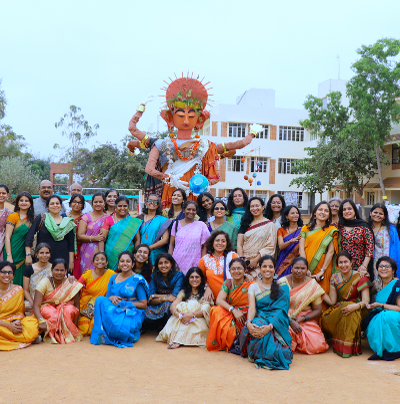
The Middle school consists of classes 4 to 8.
There are a maximum of 26 children in a class.
The middle school years are the bridge years from primary school to high school. And this is the age of industriousness for children - they generally like to keep busy! Children sometimes suddenly act like young adolescents or young adults, and sometimes they are, well, just children. High energy, high curiosity and non-stop interaction seem to be the hall mark of this age-group. More boundaries, more focus on keeping them busy and a good camaraderie between teacher and student do help!
Here we have teachers who are qualified, learners, passionate, rigourous and are subject experts.

Learning Programme and Focus
The ‘Active Learning’ approach is followed to help children be deeply involved in the learning process. In Active learning, sessions are orchestrated such that the student has to apply his mind and take charge of learning, and cannot fall back on rote learning. The focus of testing is both content and application oriented, which is required for the ICSE curricula.
For children in this age group the focus is on both:
Academic Rigour – purposefulness, exactness, building knowledge base, regular practice, habit formation and skill building
And Intellectual Rigour – sense of enquiry, wonder, critical and wholistic thinking, going beyond text book and subject integration

The Way Learning Happens...
- Science Blasts
- Live Project – which addresses current ad live issues using ‘hands-on’ modality
- Academic Projects and assignments
- Projects including open project- enables exploration of topics that trigger children’s curiosity and interest.
- Focus on Indian Knowledge System through research, discussions, games and using hands on modality.
- Group study and peer learning- to foster collaboration and to learn from each other.
- Self Study- to take responsibility of ones learning
- Presentations in classrooms and assemblies.
- Regular study habits at home and regularity in submitting home-work
- Life skills – perspective building through, conversation, circle time, celebrations and other non-purposive engagement.
- Infrastructure- The interesting spaces here are the Humanities Room, the Middle school activity room, the Art and craft Space, the Reading room and the terrace garden, which provide the right ambience for all the SUPW activities

- Co-curricular activities - yoga, theatre, art and craft, weaving and pottery.
- Talent development - Bharanatyam, contemporary dance, carnatic music, tabla, hindustani music.
- Sports & Games - Physical activities which are essential for good health forms an integral part of the curriculum. Children are encouraged to play regularly to improve their ‘personal best’, and develop basic skills in all the games which are played at school. There are three trained physical education teachers for guiding the children. Annual sports day is organized in which all the members of the five houses participate to give their personal best.
- Music, Art & Craft, Theatre - children take part in Music (singing), Dance, Theatre and Arts and craft activities. Other activities include Public Speaking, Debate, Quizzes, Clay modelling.

- Library Programme - to ignite a passion for books in children, to introduce them to rich vibrant world of books and to convert them from a passive reader into an active thinking reader through discussions, book readings and book reviews.
- Field Trips & Excursions - 2 -3 one day field trips, One long trip (3-4 days) with the focus on eco-consciousness, heritage or culture.
- Shramdhan – community service, wherein children help in the kitchen by cutting vegetables and getting the place ready for the afternoon lunch or go to the gubbachi schools to interact and engage with the children there
- Nature walks - in and around the campus
- Gardening – in the bhoomi network campus

Assessment
- Continuous assessment during the first and the third terms, one unit test in the third term and two term end examinations, one at the end of a term and one at the end of the year.
- The focus is to prepare them for the exam oriented academic rigour in addition to the intellectual rigour which is the focus of many of our activities. Regular class tests and assignments are given to keep up the momentum.
- Alternative Methods of Testing(AMT) wherein children are tested for comprehension of concepts through role play, recitation, group discussions, debates, model making, flow models, presentation of papers.
- Regular class tests and assignments/projects
In addition to this, the focus is also on the quality of written presentation, which includes minor detailing and handwriting. Parents will be called for meetings to reinforce study habits & boundaries.
Children also have a No Bag day, wherein they come in only with some reading material. The objective is to enable children to go beyond the text book and have exploratory sessions and discussions . These sessions are usually held by parents who volunteer to conduct activities in whatever topic they feel the children can be drawn into eg. Impact of advertisements

Infrastructure
The Middle and High School block has spacious class rooms, laboratories, audio visual facilties and an auditorium. The interesting spaces here are the Humanities Room, the Thinking Process Lab, the Art and craft Space, the Reading room and the terrace garden, which provide the right ambience for all the SUPW activities. Large windows and lobby spaces flowing into the outdoors bring nature into the work areas.

Prakriya - At a Glance

Events

Expressions

The Bhoomi Connection

Special Features

